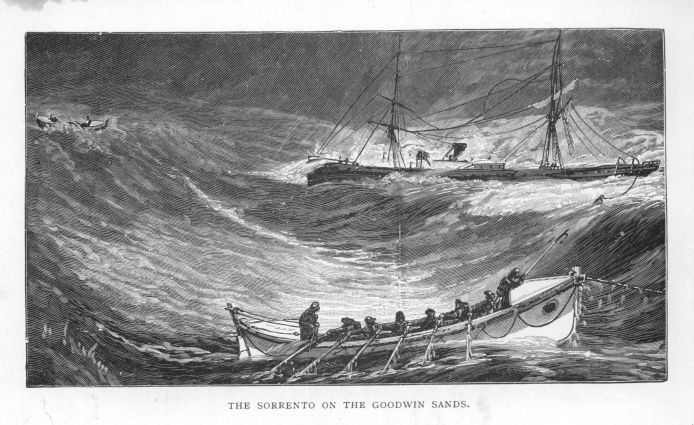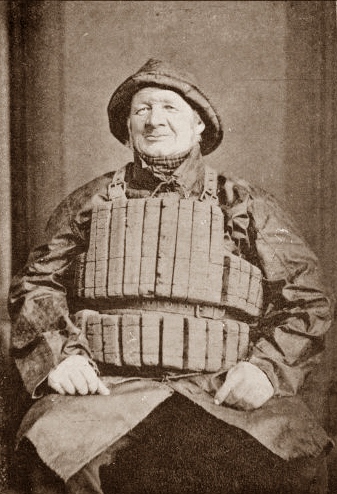 Jarvist Arnold (1815-1896) was the fifth of 13 children born to John Foreman Arnold and Sarah Jarvist. He was skipper of the lifeboat in the village of Kingsdown on the East Kent coast and became a celebrated hero, due to the lives he and his crew saved from the treacherous seas. Much of the following account which tells of the rescue of the crew of the SS Sorrento on the night of December 17, 1872, comes from a book called ‘Heroes of the Goodwin Sands‘ by the Rev Thomas Stanley Treaner, published in 1904 by The Religious Tract Society. Rev Treaner was Chaplain of the Deal and Downs branch of the Seaman’s Mission and thus had first-hand experience of the mariners who saved lives at sea.
Jarvist Arnold (1815-1896) was the fifth of 13 children born to John Foreman Arnold and Sarah Jarvist. He was skipper of the lifeboat in the village of Kingsdown on the East Kent coast and became a celebrated hero, due to the lives he and his crew saved from the treacherous seas. Much of the following account which tells of the rescue of the crew of the SS Sorrento on the night of December 17, 1872, comes from a book called ‘Heroes of the Goodwin Sands‘ by the Rev Thomas Stanley Treaner, published in 1904 by The Religious Tract Society. Rev Treaner was Chaplain of the Deal and Downs branch of the Seaman’s Mission and thus had first-hand experience of the mariners who saved lives at sea.
The Goodwin Sands are a great sandbank, eight miles long and about four miles wide, rising out of deep water four miles off Deal at their nearest point to the mainland.
Since the first recorded shipwreck in the Goodwin Sands area dating back to 1298, the maritime history is one of enormous loss of life and shipping. Ships, the crew and passengers that become stranded on the sands were often facing a terrible fate. Typically a ship would break its back as the tide changed, survivors may have been able to clamber onto the sand as the tide receded, and light fires and attempt to attract the attention of the Boatsmen of Deal and Kingsdown. If no help was forthcoming then within hours the tide would return, the sands would turn into lethal quicksand, and ships and survivors would be engulfed. Many ships were simply swallowed whole within a few days.
There are over 1,000 recorded shipwrecks, and its likely that the true number may be more like 2 or 3 times that many.
The Lifeboatsmen of Walmer, Deal and Kingsdown were the centre of an industry along the East Kent coast, saving lives, but perhaps more importantly to them, earning a living from the salvage of wrecked shipping. The ‘industry’ had up to 1,000 men involved at any one time over the centuries, and at the first sign of a wreck dozens of boats would race to be the first to board a wreck and hopefully claim salvage rights. There were four rival groups: Kingsdown (skippered by Jarvist Arnold), Walmer Road, Deal South End, and Deal North End. The rivalry between the two Deal groups in particular could be described as ‘bitter’.
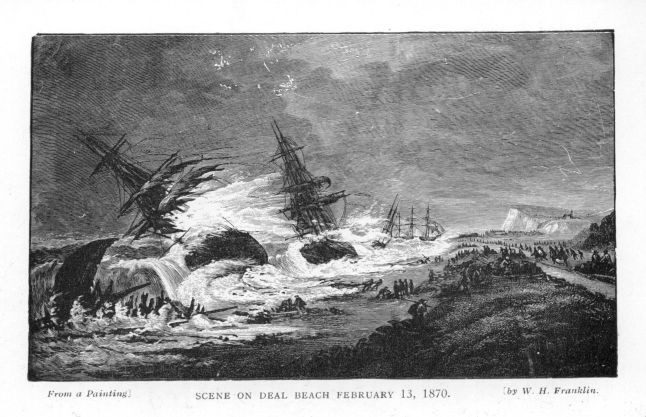
Many a stormy struggle was gone through by Jarvist Arnold and his Kingsdown lifeboat crew on the Goodwin Sands during the years 1870-1873. Holding the honourable but arduous post of coxswain of the Kingsdown lifeboat Sabrina, he also manfully earned his living as Channel pilot, being a most trustworthy and skilful seaman. He did well that which came to his hand; he did his best and his duty. I speak after the manner of men, and as between man and man. More than that no man can do.
The following account of ‘The Rescue of the SS Sorrento on 17 December 1872 is split into chapters for ease of reading.
1. ‘Man the lifeboat!’ Ship on the Goodwins!’
On the night of December 17, 1872, about 2.30 a.m., it was blowing a gale from the south-west. Out of the gale was borne landwards the boom of guns; far away on the horizon, or where the horizon ought to be, was seen the flash of their fire; and upwards into the winter midnight shot the distant rockets, appealing not in vain for help.
Almost simultaneously the coxswains at Walmer and Kingsdown were roused, William Bushell and Jarvist Arnold. At Walmer the lifeboat-bell rang out its summons, but at Kingsdown a fast runner was sent round the village, crying as he ran, ‘Man the lifeboat!’ ‘“ ‘Ship on the Goodwins!’ Up sprang the men’”that is, all the grown-up men in the village; and while the tempest shook their lowly cottage roofs, out they poured into the night, followed by lads, boys, wives, mothers, sweethearts and sisters.
Jarvist Arnold’s wife (Henrietta) said, ‘Ladies can sometimes keep their husbands, but poor women like us must let them go;’ and once more Jarvist Arnold steered his lifeboat’, ”shall I not say to victory? for ‘Peace hath her victories no less renowned than War;’ and this sentence might well be emblazoned on every lifeboat in the kingdom.
2. Brave hearts who ‘darkling faced the billows’.
At 3 a.m. on this midwinter night they launched at their respective stations, distant about two miles from each other, the lifeboats of Walmer and Kingsdown, and faced the sea and the storm. Think of the deed, and its hardships, and its heroism; of the brave hearts who ‘darkling faced the billows,’ and the anxious women left behind, ye who live to kill time in graceless self-indulgence, and ere it be too late, learn to sacrifice and to dare.
The two lifeboats got together before they reached the edge of the Goodwins, and held such consultation as was possible in the pitchy darkness and in the roar of the sea. It was agreed between them that there would be much difficulty in finding the vessel in distress, as her signals and blue lights had ceased and the night was very dark. They decided that the Kingsdown lifeboat should go first, and if they hit the vessel they were to burn a red light in token of success, and a white light if they could not find her; but that, in any case, Walmer was to come shortly after them and search through the breakers, whether Kingsdown succeeded or not.
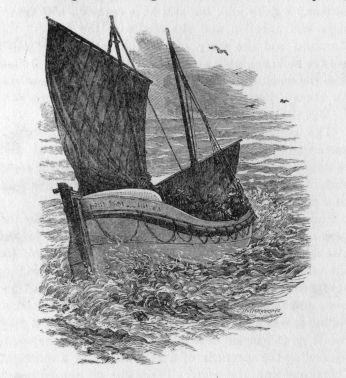
In the dark the Kingsdown coxswain put his lifeboat into the surf on the Goodwins; it was heavy, but they got through it safely, and found on the off-part of the Goodwins, towards its southern end ‘”known as the South Calliper’”a large steamship aground. She proved to be the Sorrento, bound from the Mediterranean to Lynn.
Close outside where she lay on the treacherous sands were thirteen and fourteen fathoms of deep water, that is, from seventy to eighty feet, while she lay in about six feet of white surf, which flew in clouds over her as each sea struck her quarters and stern.
The Sorrento had struck the Goodwins at midnight, or a little after, in about twenty-one feet of water, but when the lifeboat got alongside the tide had fallen, and there was only six feet of broken water around her. As the sands were nearly dry to the southward of her, the sea was by no means so formidable as it afterwards became with the rising tide and increasing gale and greater depth of water.
The Kingsdown lifeboat sent up her red light, and then came through the surf the Walmer lifeboat, guided by the red signal of success from Jarvist Arnold. Both lifeboats got alongside the great steamer, and the greater part of the crews of both lifeboats clambered on board her, leaving eight men in each lifeboat.
The head of the wrecked steamer lay about East-North-East, and the seas were hammering at and breaking against her starboard quarter, which rose high in the air quite twenty feet out of the water at the time the lifeboats got alongside. All the lifeboatmen now turned to pumping the vessel, which was very full of water, with a view to saving the ship and her valuable cargo of barley.
The Walmer lifeboat lay alongside the Sorrento, under her port bow, and the head of the Walmer lifeboat pointed towards the stern of the wrecked steamer, and was firmly fastened to her by a stout hawser.
3. ‘The water’s coming in as fast as we pump it out!’
About this time’”say, five o’clock in the morning’”while it was dark, the Ramsgate lifeboat also arrived, and seeing the other two lifeboats alongside they anchored outside the sands. And the Kingsdown lifeboat, manned only by her coxswain and seven of her crew, was sheered off about two hundred fathoms, to lay out a kedge anchor, with a view to preventing the vessel drifting farther, as the tide rose, into the shallower parts of the sands, and in the hope of warping her into deeper water.
Naturally the presence of the lifeboats and a company of seventeen or eighteen stalwart lifeboatmen, all thoroughly up to their work, infused fresh courage into the captain and crew of the Sorrento. They felt that all was not lost, and dividing themselves into different gangs of men, all hands worked with a will, throwing the cargo overboard to lighten the vessel, and pumping with all their energies’”their shouts ringing out bravely as they worked to get out the water. The donkey engine too was set at work, and steam fought storm and sea, but this time in vain. After several hours’ hard work, the engineer came to the captain and lifeboatmen and said, ‘It’s all up; the water’s coming in as fast as we pump it out. Come down and see for yourselves!’
It was too true, the good steamship’s back was broken, and the clear sea-water bubbled into her faster than it could be got out. As the day began to break, the sea rose and beat more heavily over the vessel; it burst no longer merely in clouds or showers on the deck, but in heavy volumes, and on all sides, especially to the south; long lines of rollers careered on towards the doomed vessel with tossing, tumbling crests, and then burst over her.
4. ‘Never saw anything spin round like her in my life!’
At 11 a.m. in this state of affairs the hope of saving the ship was abandoned, and all only thought now of saving life. Thinking the two lifeboats’”the Centurion and the Sabrina ‘“ were insufficient to rescue the whole of the steamer’s crew, the ensign was hoisted ‘union down’ for more assistance. None came; probably the signal was not seen, or possibly, it was thought that the presence of the lifeboats had answered the appeal.
As the tide rose the water deepened and more wind came. Heavy masses of water struck the hapless vessel, and though her starboard quarter was still ten feet out of the water, each sea swept her decks, carrying spars, hen coops, and everything movable clean before it.
All hands now fled to the bridge of the steamer, watching for a favourable moment to get into the Walmer lifeboat, still riding alongside, while each mad billow lifted her up almost to the level of the bridge and then smothered the lifeboat in its foaming bosom as she descended into the depths.
Such a great sea was seen advancing by the occupants of the bridge of the Sorrento. Combing, curling, high over the stern of the wreck it broke, carrying everything before it in one common ruin. It carried away the boats of the wrecked steamer, tearing them and the davits which supported them out of the vessel.
Snap went the strong five-inch cable which fastened the Walmer lifeboat to the port or sheltered quarter of the Sorrento, as the end of the great green sea swept round her stern; and as the lifeboat was torn away from the wreck she was forced up against the crashing jangle of the steamer’s boats and davits; and yet again with tremendous force jammed right up against the anchor of the Sorrento, which was driven into the fore thwart of the ascending lifeboat. The lifeboatmen crouched down to avoid destruction, and for all this was done in a moment away she sped, spun round as a boy would spin his top, to leeward of the wreck and among the breakers of the Goodwins.
‘Never saw anything spin round like her in my life!’ said one of the crew afterwards; and so far was she carried by this great sea that she could not drop anchor till she was half a mile from the wrecked steamship. Tide and wind were both against her, and she was utterly unable to get back to the wreck. She simply rode helplessly to her anchor with less than half of her own men in her, the remainder being clustered on the bridge, as already described, or clinging to the rigging of the Sorrento.
5. ‘Must I see my sons die in my sight?’
The aspect of affairs had now become one of extreme gravity.
The Walmer lifeboat was swept away, and as helpless as if she were fifty miles off, leaving seven of her crew in great peril on the bridge. Seven of the crew of the Kingsdown lifeboat were also gathered on the steamer’s bridge, together with thirty-two of the crew of the wrecked vessel herself. In all, there stood or clung there, drenched by the clouds of spray, drowned almost as they fought for breath, forty-six persons; and their only hope or chance for life was the Kingsdown lifeboat, which still bravely lived, heavily plunging into and covered now and then by the seas.
At the helm, in dire anxiety, was Jarvist Arnold, and with him were in the lifeboat only seven of his crew, the remainder of them being entrapped on board the Sorrento, together with the Walmer lifeboatmen. It was thought, as my readers will remember, that two lifeboats were insufficient to rescue all hands, but now the rescue’”if rescue there were to be’”depended upon one small lifeboat half manned.
Besides this, Jarvist Arnold saw with his own eyes the defeat of the Walmer lifeboat, and was so close to the wreck that he was well aware of the dangerous sea sweeping over her and racing up under her stern; but the brave fellow never faltered in his determination to attempt the rescue; and he was strung to his formidable task by the knowledge that three of his own sons were holding on for dear life on the bridge of the wreck. He could see the gestures and hear the shouts from the bridge as the sounds came across the wind, now a heavy gale.
There was no lack of resolution, but the problem was to get at the Sorrento at all, as the diagram will help the reader to understand.
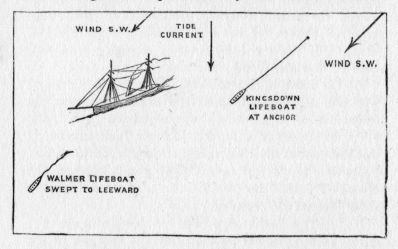
It will be plain that the tide current was forcing the Kingsdown lifeboat, even when at anchor, away from the distressed vessel, and that if she weighed anchor, she would be carried away to leeward, as the Walmer men had been.Thinking of all expedients, they bent on their second cable and rode to the long scope of one hundred and sixty fathoms. Still the cruel lee-tide and wind forced them away. They sheered the head of the lifeboat in towards the wreck’”and then’”the six men in her sprang to the oars, and tugged and strained at them, all rowing on the same side, to direct the lifeboat towards the vessel. While they struggled, the great breakers overwhelmed and blinded them, filling many times the gallant little lifeboat’”she was only thirty-six feet in length’”which as obstinately emptied herself free and lived through it all, by God’s good providence.
‘Must I see my sons die in my sight, and my friends and neighbours too?’ thought Jarvist Arnold, as he was beaten away from the vessel; and then, ‘Lord, help me!’ Again and again, in vain they struggled, when some one on the wreck sprang from the bridge at the most imminent peril of his life, on to the slippery, sloping wave-swept deck. He had seen coiled on a belaying pin on the bridge a long lead line, and on the deck still unwashed away an old cork fender.
6. ‘I’ve a great mind to trust to it’
Some say it was the mate of the vessel; others that it was one of the Kingsdown men who fastened the lead line to the fender and who slung it overboard, and then, stumbling and slipping, ran for his life back to the bridge, barely escaping an overwhelming wave. Swirling and eddying in the strange currents on the Goodwins, and beaten of the winds and waves, on came the old cork fender towards the lifeboat. They had not another bit of cable to spare on board the lifeboat; every inch of their one hundred and sixty fathoms was paid out. Breathless the coxswain, and the man in the bows, rigid as his own boat-hook with the anxiety of the moment, lashed to his position, a life line round his waist, watched the approach of the fender. It was sucked by the current towards the lifeboat, and then tossed by a wave away from her again.
Feeling assured that a great loss of life must soon occur, either by the people on the frail refuge of the steamer’s bridge being swept off it, or by the bridge itself being carried away by the seas, whichwere becoming more solid every moment, Jarvist and his comrades thought the cork fender was a long time in reaching them. Lives of men hung in the balance, and minutes seem hours then.
At last it drifted hopelessly out of reach, but into a curious backwater, which eddied it right under the boat hook of the bowman. In an instant it was seized, and the line made fast to a thwart. ‘I’ve a great mind to trust to it,’ said Jarvist Arnold, but caution prevailed, and they made fast a stout rope to the lead line.
Again the people on the bridge watched their chance. One man managed to wade along the now submerged deck to reach the lead line, and he hauled it with the stronger rope on board, making the latter securely fast. Again had this man to fly for life up the bridge from an advancing billow, which, leaping over the stern of the wreck, nearly overtook him, and at the same time by its great weight and impulse, beat the stern of the steamship a little way round to the west.
Hauling on this cable without letting go their own anchor, Jarvist Arnold and his small crew hauled their lifeboat as close under the leaning bridge as they dared.
The first man who tried to escape from the bridge in his leap missed the lifeboat and fell into the sea, and not a moment too soon was grasped by friendly hands and dragged into the lifeboat.
7. ‘Slip your cable, and come after us!’
The direction of the tidal current on the Goodwins shifts every hour to a different point of the compass; and now this strong eddy, being altered still more by the position of the wreck, would suck the lifeboat towards the stern of the wreck. There she would meet another current of the truer tide, and get hurried back again half buried in breakers, which were ever and anon bursting over and round the stern of the wreck.
Then she would come back under the bridge, where every effort was made to hold her by stern ropes; and as she rose, ‘by the dreadful tempest borne, high on the broken wave,’ man after man they jumped, or were dragged, or came quick as lightning down a rope, into the Sabrina, the whole forty-six of the imperilled men, the captain being last man, and almost too late.
Bringing with them the old cork fender as a memento, Jarvist and his unbeaten crew sheered out their lifeboat to ride by their own cable, as before the timely arrival of the fender. Now they saw signs of the approaching break up of the Sorrento, for before they had left her very long her funnel and masts went overboard, and reeling to the blows of the sea, she split in halves and disappeared under the breakers of the Goodwins.
But before this dramatic conclusion, the Kingsdown lifeboat slipped her anchor, to which she never could have got back, and setting her mast and double-reefed storm-foresail, ran away before the wind through the ‘heavy boiling surf’ on the Goodwins. These are the coxswain’s own written words, and I can only repeat they are below the grim reality.
With the forty-six rescued seafarers on board she was terribly low in the water, and was filled in and out from both sides at once by the seas as they broke. Only a lifeboat could have lived, but even she resembled a floating baulk of timber, which is covered and swept by the seas on the same level as itself. Holding on for life to thwarts and life-lines, they kept the lifeboat dead before the sea. They did not dare to luff her to the west or bear her away to the east. They dared not keep away to get to the Walmer lifeboat, nor in the other direction toward the mainland, about six miles off.
The slightest exposure of the broadside of the lifeboat would either have capsized her, or washed every soul out of her; onwards, therefore, dead before the wind and right on the top of and in the breakers of the Goodwins she flew her stormy flight for nearly four miles.
The Walmer lifeboat had got up anchor at the same time as the Kingsdown men; for as the Kingsdown overcrowded lifeboat ran past the Walmer lifeboat, which was waiting at anchor for them, they shouted to the Walmer men, ‘Slip your cable, and come after us!’
This the Walmer lifeboat did, and now ventured to approach the Kingsdown lifeboat. Though handled with skill and caution, being light, she took a sea; and she came right on top of the gunwale of the Kingsdown lifeboat, smashing her oars, which were run out to steady her, like so many pipeshanks, and crunching into her gunwale.
But at last, with difficulty, half of the living freight of the Sabrina was transferred to the Walmer lifeboat; and then both lifeboats luffing in through Trinity Swatch, by God’s mercy, escaped the deadly Goodwins, and landed the rescued crew at Broadstairs.
And the gallant deed is still sung by the Kingsdown children in simple village rhymes:
God bless the Lifeboat and its crew,
Its coxswain stout and bold,
And Jarvist Arnold is his name,
Sprung from the Vikings old,
Who made the waves and winds their slaves,
As likewise we do so,
While still Britannia rules the waves,
And the stormy winds do blow;
And the old Cork Float that safety brought,
We’ll hold in honour leal,
And it shall grace the chiefest place
In Kingsdown, hard by Deal!
One of Jarvist Arnold’s sons never recovered the strain of those awful hours on the bridge of the Sorrento in her death-throes, and, to use his father’s words: ‘He never was a man no more.’ But Jarvist himself did many a subsequent good deed of rescue, and stuck to his arduous post as long as, and even beyond, what health and strength and age permitted.
Would that I could say that the noble old fellow was in independent circumstances! Despite the continued generosity of the Royal National Lifeboat Institution to him, alas! this is not the case. Would that some practicable scheme for providing a pension for deserving working men in their old age were before the country!
Jarvist Arnold is, however, not forsaken; he has good and honourable children, and I know that with that inner gaze which sees more clearly as eternity approaches, he too in simple faith beholds the advancing lifeboat, and hears the glad words, ‘When thou passest through the waters, I will be with thee; and through the rivers, they shall not overflow thee, from the mouth of the Great Commander.
Jarvist Arnold was something of an international hero – a couple of months after his death, obituaries were printed in newspapers as far flung as ‘The Independant’ in Honlulu in Hawaii (‘Lifeboat Coxwain Dead’) and the ‘Australian Town and Country Journal’, Sydney, Australia (Salvor of One Hundred Lives’).
Sources: http://uk-shore.com/blog, www.gutenberg.org, http://kingsdownkent.blogspot.com, Marcia Nelson
